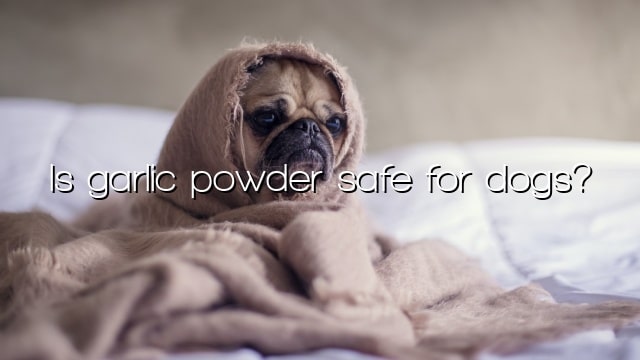Garlic powder is safe for dogs, but it should not be given in large quantities. Garlic can cause an upset stomach in dogs, so it’s best to start with a small amount and increase the dosage slowly if your dog doesn’t seem to have any adverse reactions.
How much garlic powder is toxic to dogs?
Garlic powder is not toxic to dogs, but it can make them sick. Garlic contains a compound called allium that can cause gastrointestinal upset in dogs. So, if your dog eats a lot of garlic powder, they may experience vomiting, diarrhea, and abdominal pain.
What happens if a dog eats garlic powder?
Garlic powder is not toxic to dogs, but it may make them sick. Garlic can cause an upset stomach, diarrhea, and vomiting in dogs. If your dog eats garlic powder, monitor their symptoms and call your veterinarian if they worsen.
Can dogs have garlic and onion powder?
Garlic and onion powder are not toxic to dogs, but they can cause gastrointestinal upset, so it’s best to avoid giving them to your dog.
Does garlic powder help dogs with fleas?
There is no scientific evidence to support the use of garlic powder as a flea treatment for dogs. In fact, garlic can be toxic to dogs in large doses, so it is best not to use it as a flea treatment. There are many safe and effective flea treatments available that can be used on dogs.
Will a little garlic powder hurt a dog?
Garlic is toxic to dogs and can cause serious health problems.
Can dogs eat honey?
Yes, dogs can eat honey. Honey is a natural sweetener and it has a lot of health benefits for dogs. It can help to improve their digestion, boost their immune system, and help to fight off infection.
How long after eating garlic will a dog get sick?
Garlic is toxic to dogs and can cause them to vomit or have diarrhea. Symptoms usually occur within 12 hours of ingestion, but they can show up as late as 48 hours later.
What should I do if my dog eats garlic?
Garlic is toxic to dogs and can cause serious health problems. If your dog eats garlic, call your veterinarian immediately.
Can garlic cause seizures in dogs?
Garlic is not known to cause seizures in dogs, but it is always best to speak with your veterinarian if you are concerned about any potential interactions between garlic and your pet.
What if a dog eats a small piece of onion?
Onions are toxic to dogs and can cause serious health problems, including liver damage. If a dog eats a small piece of onion, there is a chance that he will experience some mild symptoms, such as diarrhea, vomiting, and lethargy. However, if the onion is swallowed in large quantities, it can be fatal.
Can dogs eat tomato?
Yes, dogs can eat tomatoes. Tomatoes are a good source of antioxidants, and they also contain vitamin C and potassium. However, you should only give your dog a small amount of tomato at a time, and you should avoid giving your dog canned tomatoes, which can be high in sodium.
Is onion powder in chicken broth bad for dogs?
Onion powder is not toxic to dogs, but it can make them sick. Dogs that eat onion powder can experience vomiting, diarrhea, and panting.
What foods are unsafe for dogs?
There are a few human foods that are unsafe for dogs. These include chocolate, onions, garlic, and grapes.
Are eggs good for dogs?
There is some debate over whether or not eggs are good for dogs, but most experts seem to agree that they can be a healthy part of a dog’s diet. Eggs are a good source of protein, and they also contain important vitamins and minerals. However, it’s important to make sure that your dog doesn’t eat too many eggs, as they can also be high in cholesterol.
Is cheese bad for dogs?
Cheese is not inherently bad for dogs, but it can be dangerous in large quantities. Cheese contains high levels of fat and sodium, which can cause digestive problems and obesity in dogs. It’s best to avoid giving your dog cheese as a regular snack.
